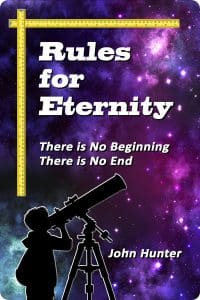About Rules for Eternity by John Hunter
Rules for Eternity attempts to marry the science-of-the-day with the unanswerable questions. As the author takes readers through the big questions and the various approaches to arrive at logical answers, the quest feels nothing less than an exciting ride full of discovery. What rules determine the existence and evolution of the universe? What rules govern the creation and evolution of life, particularly intelligent life, on a planet? Are these rules pre-determined or do they also come into play at the time of creation? Do we have hope for eternal existence of life or are we doomed for a dismal scenario?
Notably, Rules for Eternity is more than a work exploring cosmology via philosophical questions as it pays a good deal of attention to human psychology. Fundamental questions about behaviour, instinct, and intelligence are brought up in the context of the book’s main themes. Readers also don’t miss on seeing the social and psychological roles of religion in shaping human thought on these key points as explored by Hunter in the chapter Why We Need Gods. Perhaps the most important question that this book attempts to answer is as philosophically grand as it is scientifically challenging: What are our limits?
In Rules for Eternity, John Hunter offers a great serving of food-for-thought for the science enthusiast and truth-seeking minds. It’s a discussion the thoughtful reader can’t resist nor afford to miss.
Buy the book, and follow the author on social media:
Learn more about the writer. Visit the Author’s Website.
Author Bio:
John was raised in regional Australia, where an uncluttered lifestyle provided ample opportunity for hands-on exposure to the wonders of nature. At the University of Melbourne he took out an honours degree in Science, thus qualifying as a Particle Physicist. Although he was well-qualified and enthusiastic, it soon became apparent that nuclear-phobic Australia offered quite limited career prospects in that field. He then completed a second degree in Electrical Engineering.
For several years John worked with Schlumberger as an oil engineer, before retiring to coastal Queensland where he established a small electronics business. It was not commonly known, but this business was purely a front to facilitate his desire to invent things. His proudest achievement was possibly the Computaphon, the world´s first electronic phone.
None of John´s inventions was ever commercialised as he expressed little interest beyond building prototypes and proof-of-concept. He later gravitated to software development, a pursuit which continues to this day. However, none of these ´day jobs´ managed to overshadow his fundamental love –- Cosmology.
